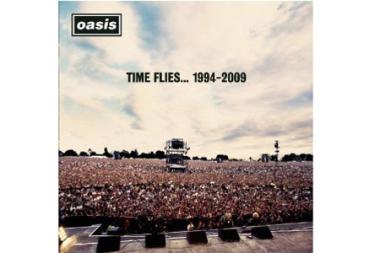Oasis
Time Flies… 1994-2009
(Columbia)
Brit-pop titans Oasis are the ideal band for a greatest hits collection. Their uneven catalog is ripe for cherry-picking, but so far nobody has gotten it right. 2006’s Stop the Clocks focused too much on rarities and B-sides.
The new Time Flies, which collects all the band’s U.K. singles, is an improvement. It includes iconic tracks such as “Wonderwall,” “Live Forever” and “Don’t Look Back in Anger” alongside lesser-known gems like “Falling Down.” These songs make the case for Oasis’ ability to deliver tuneful snarl and gently psychedelic ballads. Unfortunately, the two-disc format places too much emphasis on the later part of the band’s career. The anthology serves up five songs off the lackluster Heathen Chemistry while omitting key album tracks and choice B-sides. A more judicious selection would make a better case for the band, but for the casually curious, this is the place to start. —Jeff Jackson
Breathe Owl Breathe
Magic Central
(Home Tapes)
Hailing from rural Michigan, the members of Breathe Owl Breathe conjure enchanting yet rough-hewn melodies on their debut. According to the band, the album is named for the log cabin where the trio lives and is a representation of “a place where there is no distinction between working, creating, songwriting, practicing and playing.” Musically, that approach equals a batch of freewheeling folk songs that feature acoustic guitar, piano, and simple banjo.
“Dragon” is a whimsical fairy tale starring a princess and her reptilian pen pal. Closing track “Lions Jaw” features the sound of actual children who seemingly “roar” their approval of the music. While such antics possess a certain shambolic charm, many listeners will find little that merits repeat listening. Still, it’s enjoyable to see a band whose members are so comfortable in their own skins. Spoiled pop stars take notice. —Michael Cimaomo
Max Eider
Disaffection
(Tundraducks)
There’s something immediately familiar about Max Eider’s music. Jangly guitar winds through the kind of comfortable pop progressions that have underpinned many a song. Eider holds forth with a light, pleasantly bright vocal style that hails from the ’80s—no surprise when you learn that Eider played in ’80s pop band The Jazz Butcher. The standout is “Evolution,” a weird combo of those ’80s tropes and an upbeat Tinpan Alley swing feel, sporting a dark sentiment: “We’re self-conscious and we talk/ we no longer need to walk/ what can possibly go wrong?”
Disaffection doesn’t sound disaffected at first blush, full as it is of earnest pop. Listen closely and something more surfaces: “don’t look for compassion/ here there’s none.” Then there’s “Analgesia,” a love song to an unusual mistress. Somehow that omnipresent brand of undercutting makes the result a more emotionally complex listen—it’s hard not to be curious what will happen next. —James Heflin



